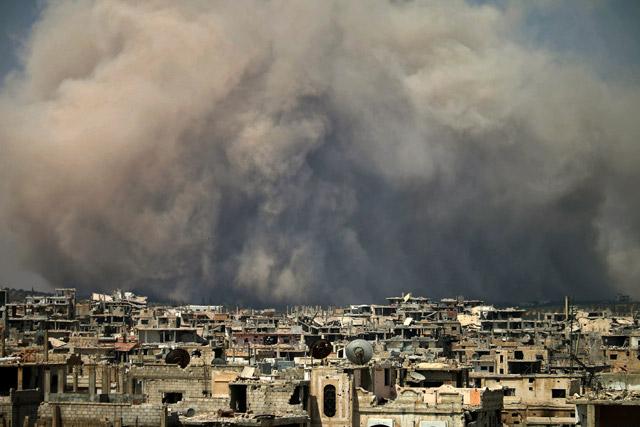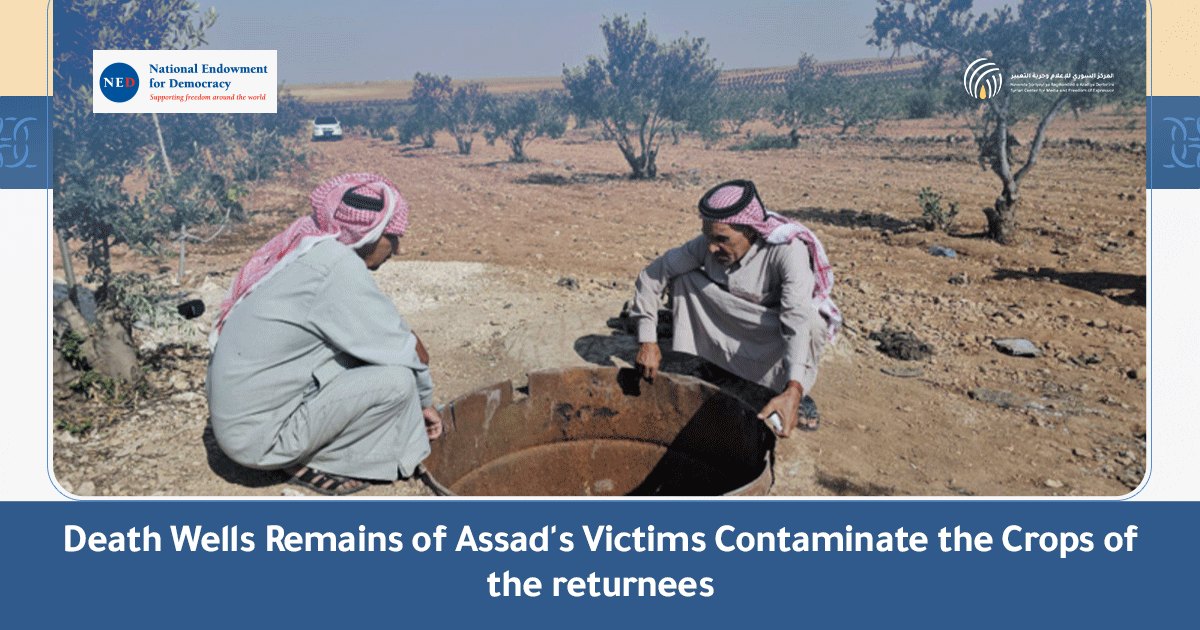
To:
-
Guarantor states of the de-escalation agreements
-
International donors.
-
Humanitarian Leadership.
-
UN agencies.
Syrian NGOs signing below received the news about de-escalation zones agreements between conflict parties in and around E. Ghouta in rural Damascus with great cautious. While the agreements stated ceasing military hostilities and increasing humanitarian access, they didn’t define exactly what is meant by this increase, nor did it mention any urgent necessary measures to alleviate the suffering of trapped civilians.
The humanitarian situation in Eastern Ghouta today had reached a catastrophic level. Around four hundred thousand people are suffering from a tight siege in a nearly full absence of commercial and individual movement to and from the besieged Ghauta. The United Nations in Damascus is also suffering from a catastrophic failure in humanitarian access to the besieged rural Damascus, mainly due to the frequent refusal of Damascus government of giving the necessary permissions and also the numerous obstacles, which, in most times, delay or hinder the delivery of humanitarian convoys that have already been approved. Moreover, humanitarian convoys already prepared based on needs assessment are subject to complete changes by Damascus government officials, including removal of many essential life-saving materials. For example, antibiotics are being omitted from medical aids. In addition, humanitarian response analysis reports and access reports to besieged people in Syria do not reflect their living conditions and do not evaluate it as evidence of the effectiveness and the quality of the humanitarian convoys. Rather, they rely on the number of delivered convoys and the number of people in need these convoys are enough for.
A family in besieged area does not need a food basket once a year, but according to needs assessments, the needs are very severe and cross-sectoral. Inter-Agency convoys delivery patterns show they are very far from covering those needs. Moreover, humanitarian needs of the besieged population are not limited to goods and gifts in kind, but are in need of various humanitarian programs such as livelihood, agriculture, psychosocial support and different protection programs. Humanitarian NGOs working in Eastern Ghouta across the border find themselves alone to provide all these programs and to fill the gaps in the context of a severe resource shortage and continuous decrease in funding cross-border humanitarian operations.
Syrian Non-Governmental Organizations signing below request immediately:
- From guarantor states of De-Escalation Zones:
- Full commitment to their obligations and practicing the necessary pressure to improve humanitarian access to the besieged people in Eastern Ghouta via:
- Immediate opening of commercial crossings and allowing free entry and exit of goods in and out of the besieged area as well as preventing extortion and blackmailing which take place at the check points around Eastern Ghouta. These practices cause sharp rise in the price of goods entering the besieged area.
- Immediate opening of humanitarian crossings to evacuate all the critical medical cases.
- Applying effective monitoring of the mechanisms to approve cross-line convoys and to ensure their continuous flow on a regular basis, including all essential materials identified in accordance with humanitarian needs assessments, especially medical materials.
- From International Donors, Humanitarian Leadership and United Nations agencies:
- Stand up to their responsibilities and provide direct and immediate funding to the non-governmental humanitarian organizations operating in Rural Damascus Eastern Ghouta to enable them to provide immediate assistance to the besieged people protecting them from falling into real famine that threatens the lives of tens of thousands.
Signatories:
- The League of Syrian Networks which consists of:
- Elaf Union for Relief and Development.
- Syria Relief network.
- Syrian General Union – SGU.
- Foundation of Civil Society Organizations.
- Syrian Civil Coalition (TAMAS)
- Platform of Syrian Associations.
- Maan Association.
- Sham Sharif Association.
- Zaid bin Thabit Association.
- Zdni Elman Association.
- Ahl Horan Association.
- The Syrian Alnour Association.
- Emaar Al Sham Humanitarian Association.
- Ataa for Society and Relief.
- Ibn Al-Nafees Association.
- Union of Syrians Abroad Organization.
- Al-Basr Foundation for Humanitarian Services.
- AlTadamon for Development.
- Local Development Organization (IDO).
- Civil Care.
- Syrian Human Care and Development (Msrat(
- Al Sham for orphans care Association.
- International Foundation for Women’s Support.
- Social Development International Association SDI.
- Syrian Association for Humanitarian Development and Support INSURYA.
- Bonyan Organization.
- Takaful Al-Sham Charity Organization.
- Takaflu Association for Orphans Care.
- Syria Al ghad.
- Shamna for Medical.
- Sham Humanity Association.
- Sham Hayat Association.
- Shafaq Sham Charity.
- Grass Alkhair Humanitarian.
- Grass Foundation.
- Insan For Psychosocial Support Association.
- Nour Al Hedaya.
- Humanitarian Relief Association (IYD).
- International Humanitarian Relief Association (IHR).
- Horan Islamic Organization (Ataa).
- Gana Watan Association.
- Al Marifa Authority for Education and Culture.
- Al Marifa Society For Development & Education.
- All For Charty.
- Human development.
- Hema Association.
- Imaar for Reconstruction Association.
- Development of civil society.
- Hayat Association For Charity & Humanity.
- Al-Bonyan Al-Mursub Association.
- Syrian NGOs Alliance, Consisted of:
- Al Sham Humanitarian Foundation – AHF
- Big Heart Foundation.
- Binaa Organization for Development.
- Ghiras Al Nahda.
- Ghiras Foundation for Child Care.
- Hand In Hand for Syria.
- Ihsan for Relief and Development – IRD.
- Masrrat – The Syrian Establishment For Human Care & Enhancement.
- Physician Across Continents – PAC.
- Syrian American Medical Society – SAMS.
- Syrian Expatriate Medical Association – SEMA.
- Social Development International – SDI.
- Syria Relief and Development – SRD.
- Syria Relief-SR.
- Takaful Al Sham Charity Organization.
- Union of Relief and Medical Care Organizations – UOSSM.
- Orient for Human Relief.
- Violet Organization for Relief and Development.
- Other Organizations:
- Adaleh Foundation for relief and development.
- Ahl Al-Balad Organization.
- Al- Ameen for Humanitarian Support.
- Al-Aml Association for Cancer.
- Alkawakibi Organization for Human Rights.
- Alkhadraa Organization.
- Alwafaa Association for Relief ana Development.
- Basamat for development.
- Baytna Syria.
- Elaf for Relief and Development.
- Emissa for Development.
- Foundation of Civil Society Organizations.
- Human Rights Guardians.
- Jozour Development & Sciences Organization.
- Masar Research Center.
- Nas Organization.
- Rakeen Organization.
- Sadad Humanitarian Organization.
- Solidarity Organization for Syria.
- Syrian Center for Media and Freedom of Expression.
- Syrian Center for Studies and Human Rights.
- White Hats Organization.
- White Helmets.
- Al-Ghouta youth volunteering team.
- Syrian activists monitoring.
- Damas House.
- Hurras Network.
- Hadith Humanitarian Aid Organization.
- Kudra Social Development Solutions.
- Center for Civil Society and Democray – CCSD.
- Local Development and Small-Projects Support (LDSPS).
- Oppressed Supporters Association.
- Aitam Al-Sham for orphans care.
- Syrian Network For Human Rights-SNHR.
- Syrians for Truth and Justice-STJ.
- Independent Doctors Association.





